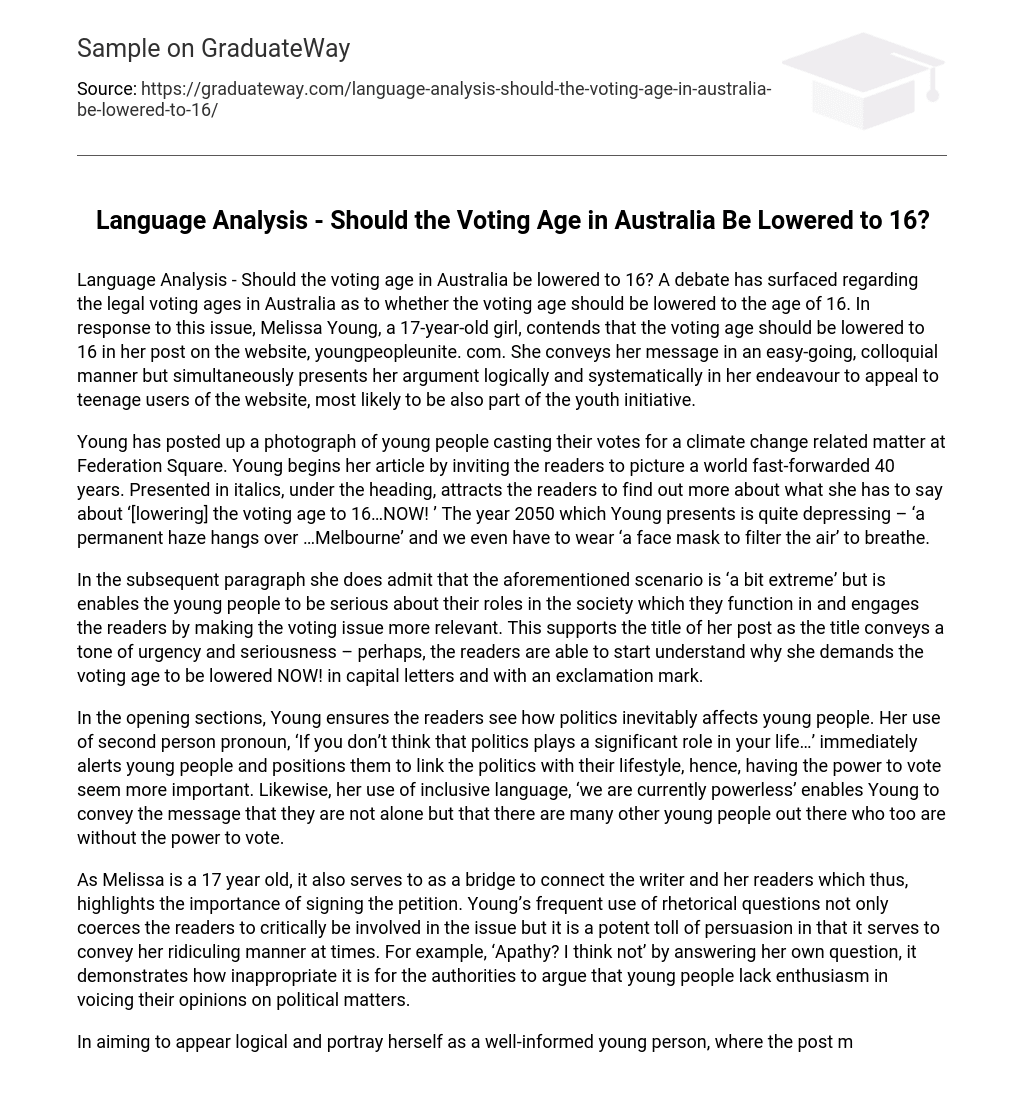Language Analysis – Should the voting age in Australia be lowered to 16? A debate has surfaced regarding the legal voting ages in Australia as to whether the voting age should be lowered to the age of 16. In response to this issue, Melissa Young, a 17-year-old girl, contends that the voting age should be lowered to 16 in her post on the website, youngpeopleunite. com. She conveys her message in an easy-going, colloquial manner but simultaneously presents her argument logically and systematically in her endeavour to appeal to teenage users of the website, most likely to be also part of the youth initiative.
Young has posted up a photograph of young people casting their votes for a climate change related matter at Federation Square. Young begins her article by inviting the readers to picture a world fast-forwarded 40 years. Presented in italics, under the heading, attracts the readers to find out more about what she has to say about ‘[lowering] the voting age to 16…NOW! ’ The year 2050 which Young presents is quite depressing – ‘a permanent haze hangs over …Melbourne’ and we even have to wear ‘a face mask to filter the air’ to breathe.
In the subsequent paragraph she does admit that the aforementioned scenario is ‘a bit extreme’ but is enables the young people to be serious about their roles in the society which they function in and engages the readers by making the voting issue more relevant. This supports the title of her post as the title conveys a tone of urgency and seriousness – perhaps, the readers are able to start understand why she demands the voting age to be lowered NOW! in capital letters and with an exclamation mark.
In the opening sections, Young ensures the readers see how politics inevitably affects young people. Her use of second person pronoun, ‘If you don’t think that politics plays a significant role in your life…’ immediately alerts young people and positions them to link the politics with their lifestyle, hence, having the power to vote seem more important. Likewise, her use of inclusive language, ‘we are currently powerless’ enables Young to convey the message that they are not alone but that there are many other young people out there who too are without the power to vote.
As Melissa is a 17 year old, it also serves to as a bridge to connect the writer and her readers which thus, highlights the importance of signing the petition. Young’s frequent use of rhetorical questions not only coerces the readers to critically be involved in the issue but it is a potent toll of persuasion in that it serves to convey her ridiculing manner at times. For example, ‘Apathy? I think not’ by answering her own question, it demonstrates how inappropriate it is for the authorities to argue that young people lack enthusiasm in voicing their opinions on political matters.
In aiming to appear logical and portray herself as a well-informed young person, where the post mainly employs a passionate tone, Young systematically breaks down each of the arguments presented in the VEC’s research conducted in 2004 on why 16 and 17 year olds should not vote in elections. Young’s use of direct quotations from the VEC demonstrates she has undertaken her own research and hence, increases the credibility of her as an ‘engaged…Youth Spokesperson’.
In addition, by employing terms such as ‘reason number two’ allows Young to appear as one with logic, which is further supported by the statistics used by her in aiming to show that young people are not ‘lack of interest’. Her way of presentation of arguments enable any older readers who may be accessing the website to understand the argument presented and the adults to clearly see the fallacies which they put forward as reasons to saying no to lowering the legal voting age. Although small, in relation to the size of the coverage of the post – over the two pages, the accompanying visual is a powerful one.
Photographed with the focus being on the girl who is actually casting the vote, which allows the people who are lining up to seem small – it alludes to the notion that the line is endless. In addition, the people photographed display a positive atmosphere by smiling and it is evident that they are all eager to cast their vote in the Australian Youth Climate Coalition. Positioned directly underneath the words, ‘Apathy? I think not’, the visual serves as an evidence to serve this claim. Presented on the webpage, accessible to ‘tech-savvy’ generation with a visual and further links to seek more information if they ‘liked this site’, it ppeals to the targeted audience. In addition, Young has used capital letters to write the words ‘click her to sign …’ enclosed in a box. The phrases ‘clicking on the link below’ and ‘signing the attached petition’ presented in bolder font further urges the readers to join the movement to ‘make everybody’s 2050 a little brighter’. Young presents her argument as to why the voting age should be lowered in an engaging manner and in the form which the young people are familiar with, in her endeavour to coerce them to sign the petition and hopefully to be able to vote in later in the year, for the upcoming election.





